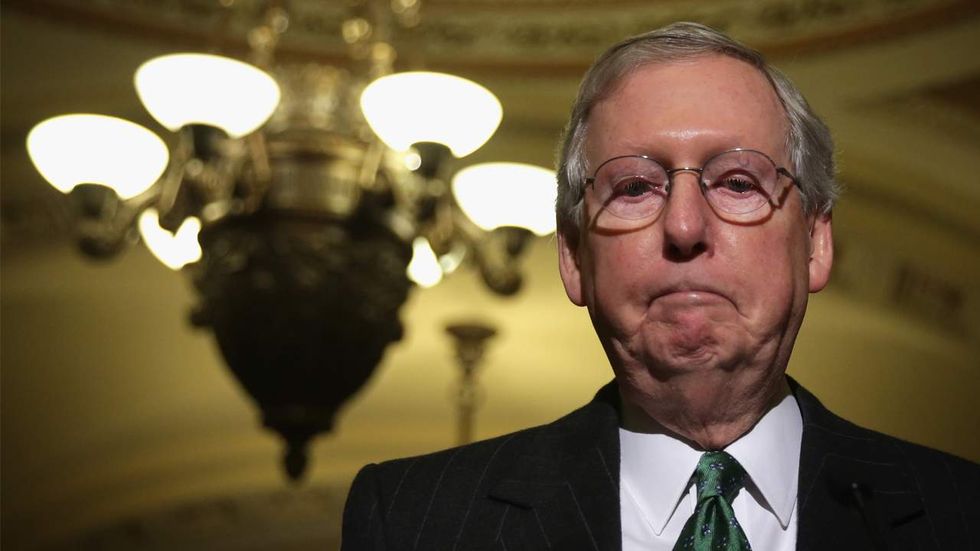
Justin Haskins argues the Senate's Better Care Reconciliation Act, released on June 22, 2017, would only exacerbate the problems created by Obamacare. (Alex Wong/Getty Images)

On Thursday, Senate Republicans released their plan to replace the Affordable Care Act, titled the Better Care Reconciliation Act of 2017. Mostly crafted behind closed doors, there’s much in the massive bill that health care experts and members of Congress need to learn about the legislation, but even if it is assumed the majority of the bill will be an improvement on Obamacare, which has unquestionably failed to deliver quality health insurance at reasonable prices, a few key provisions in the Senate bill could prove disastrous for families, health insurance companies, and, eventually, even the Republican Party.
Since the Affordable Care Act was rammed through Congress in 2010, Republicans, including President Donald Trump, have been promising to replace the law with legislation that would halt or reverse skyrocketing health insurance premiums and deductibles. BCRA proponents claim it will accomplish this goal by cutting taxes, reducing regulations, and providing states with the ability to obtain waivers to opt out of costly mandates, among other provisions.
While it’s likely these reforms would on their own help to fix some of the defects of the current system, they don’t solve Obamacare’s fatal flaws: the preexisting conditions clause and community-rating requirements. In fact, one important change in the Senate’s bill would likely make those significant problems much worse.
Like in the House’s American Health Care Act, the Senate bill would not allow states to pass laws allowing health insurance companies to deny coverage to anyone who applies, including uninsured applicants with costly preexisting conditions. Unlike the House bill, the BCRA also forces states to mandate health insurance companies charge the same prices to people applying for coverage, regardless of health status, a concept called community rating. The House bill permitted states to apply for waivers that would have allowed insurance companies to charge more under certain conditions.
Requiring health insurance companies to accept all people, regardless of their health status, and mandating that they charge the same amount of money for identical coverage disincentivizes healthy consumers, especially young people, from buying health insurance, because under such a scheme, healthy people have very little reason to purchase insurance until they actually need it. These provisions, which were first ushered in under Obamacare, effectively turned “insurance” into nothing more than a health insurance giveaway for many irresponsible consumers, and insured families and individuals ended up footing the bill by paying increasingly higher premiums and deductibles.
[graphiq id="ltqOaB1HDox" title="United States Health Expenditure" width="600" height="514" url="https://sw.graphiq.com/w/ltqOaB1HDox" frozen="true"]
In their attempt to limit the number of people who might abuse these policies, the Obama administration and congressional Democrats created the wildly unpopular individual mandate, which forced consumers to purchase qualified health insurance plans or else pay a government-imposed fine, which is now $695 per adult or 2.5 percent of income, whichever is higher.
In addition to avoiding huge cost increases caused by people waiting to get sick before buying insurance, the penalty was also thought to be an important part of encouraging young healthy people, who don’t use many benefits, to buy into the health insurance market, helping to offset the high costs associated with consumers buying insurance with preexisting conditions. However, the plan didn’t work nearly as well as the ACA’s proponents said it would. Premiums and deductibles were so high that many healthy people chose to pay the penalty to save money or invested in cheaper alternatives, such as health care sharing ministries.
The BCRA could prove to be disastrous because not only does it continue the preexisting conditions and community ratings requirements, it also eliminates the individual mandate, one of the few Obamacare provisions incentivizing healthy people to buy health insurance.
Absent additional legislative changes providing solutions to these problems, it’s likely the Better Care Reconciliation Act will make health insurance even more expensive than it is now, throwing gasoline on the Obamacare fire and providing an escape hatch to Democrats eager to flee Obamacare’s immense shadow.
Justin Haskins